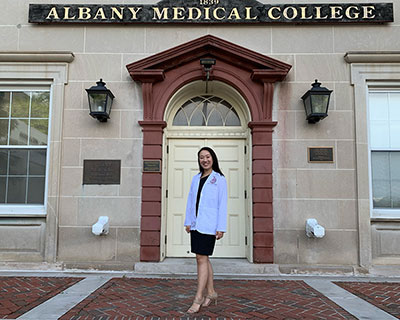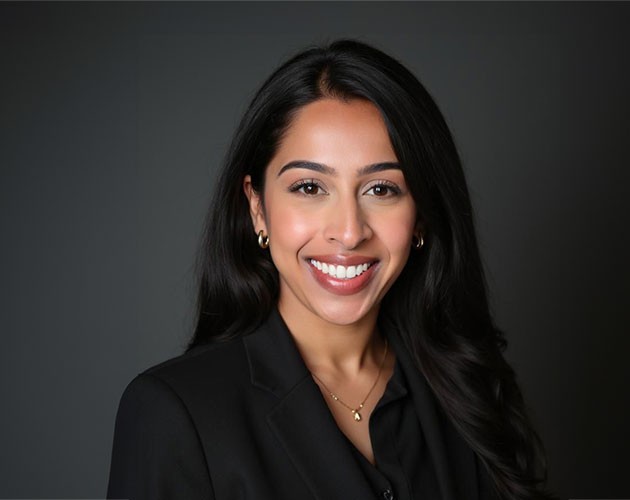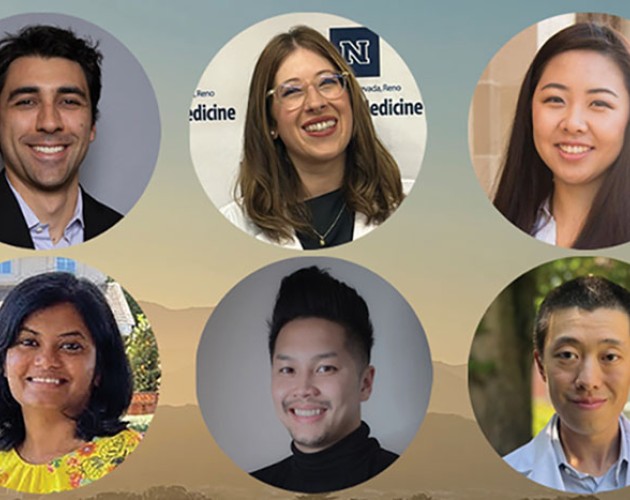A Health Professions Career Requires Lifelong Learning

“I was lucky to have excellent teachers very early in life who opened my eyes to many different subjects and fields,” reminisces Charlotte Young, a 2021 Post-Baccalaureate Health Professions Program alumna. “My interest in the life sciences began in middle school and steadily grew as I took even more science classes in high school. As I entered college, I was confident that I wanted to pursue a career in the biological sciences.”
For Bay Area native Charlotte, UC Berkeley is near and dear to her heart. “It has always been an academic pillar and a symbol of educational excellence in the community. As it’s an institution with a strong emphasis on research, I felt that attending UC Berkeley and pursuing a degree in microbial biology would give me a strong foundation in animal and plant biology.”
Not only did the University highly encourage Charlotte to pursue a breadth of interests across disciplines, but also inspired her to hone an interest in English literature and creative writing.
“Prior to attending college, I knew my interests fell into two camps: biology and English literature,” she says. “I kept an open mind throughout college with regard to my future career, and was always on the lookout for new and interesting career options.
“Pursuing a path as a physician was always in the back of my mind as a potential career, but as a freshman in college I could not confidently say that I had adequate exposure or knowledge of the career of a physician and what that truly would entail. I knew that if I wanted to make an informed decision on whether medicine was right for me, I would need to be proactive about seeking shadowing and learning opportunities.”
Build Your Knowledge Base
While at UC Berkeley, Charlotte participated in UC Davis’ premedical surgical internship, a shadowing program that she learned about through a UC Berkeley premed email listserv.
“I had just completed my freshman year and was exploring whether medicine was a path that I was ready to commit to,” recalls Charlotte. “That surgical shadowing internship allowed me to directly interact with surgeons and OR staff, and get a realistic sense of the day-to-day work of resident and attending physicians.
“I will never forget the enthusiasm and gusto of the resident physicians as they showed me how to properly read an x-ray and quizzed me about anatomical landmarks. I felt incredibly inspired by these physicians-in-training who were clearly lifelong learners and natural teachers.”
Shadowing semi-locally for a summer wasn’t her only career-building experience: Charlotte also had the opportunity to perform clinical research abroad for one year with the Eye Hospital of Nanchang.
“This opportunity was one of the most formative yet daunting experiences of my college years,” she relates. “It involved relocating to China for a year and taking a hiatus from my undergraduate studies. However, after I was offered the position, I quickly grew excited by the idea of living in a new country, learning more about the field of ophthalmology, and experiencing the practice of health care and research through a global lens. The research began as a ground-up operation and involved developing a pop-up community eye clinic in rural, southeastern China. I had the opportunity to work alongside excellent mentors in clinical research, and I still have a strong working relationship with my international colleagues to this day.”
In addition to her academic studies and enhancements, Charlotte also worked with the nonprofit Scientific Adventures for Girls. During her five years there, the roles Charlotte performed impacted her educational and professional goals in unexpected ways.
“I originally began as a part-time teaching assistant during my junior year of undergraduate,” she says. “This local nonprofit aims to bring hands-on STEM courses to elementary school-aged girls in Bay Area public schools.
“After I graduated, I was offered a full-time position as a head science instructor, and I was confident this would allow me to enhance my leadership and teaching skills. While this role was not related to medicine, I was extremely passionate about the organization’s cause. After several years of teaching in the classroom, I was excited for a new professional challenge as I transitioned into a managerial role within the company. Looking back, many of the soft skills I learned in communication, patience and compassion were mastered during my time working as a teacher and a manager.”
Charlotte was able to put those people skills to use during her career-development stints volunteering at Highland Hospital in Oakland, Calif., during the pandemic and later working as a medical assistant first at the private-practice office of Jonathan Noble M.D. and then with CityHealth urgent care clinic.
It was also around this time she recognized the need to get back to following her dream of becoming a physician and to boost her academic portfolio for her next steps.
Trust the Process
In 2019, Charlotte began preparing applications to medical schools—but it had now been a couple of years since she graduated from UC Berkeley with her microbial biology degree.
“My decision to pursue the Post-Baccalaureate Health Professions Program was primarily based on how well the program supported my goals,” explains Charlotte, on why she chose our program.
“As a non-traditional student, I had been out of school for two years and was seeking a program that had a solid offering of upper-division science courses as well as provided personalized advising to assist in navigating the medical school application process. The post-bacc health professions program not only met this criteria, but also emphasized how hands-on the advising aspect of the program would be.”
Charlotte was putting trust in the process and continuing to build her knowledge base.
“My first job working as a medical assistant was through an opportunity posted by a post-bacc adviser about halfway through my time in the post-bacc health program,” she reveals. “Though I had no prior experience working as a medical assistant, I was excited to work in a private practice setting with ample opportunity for on-the-job learning and direct supervision of my tasks by a physician.
“After gaining technical skills in a primary care setting, I transitioned to working as a medical assistant in an urgent care clinic, where I had the chance to expand my repertoire of clinical skills with higher acuity patients in a wider patient population. My employment as a medical assistant gave me a foundation for not only basic clinical skills that would later show up in our medical school curriculum—running ECGs, administering injections, wound dressing, et cetera—but it also allowed me to gain an appreciation for the administrators and schedulers who are instrumental in having a clinic run smoothly and who optimize the patient experience.”
Charlotte’s hands-on learning enhanced her education. Still keeping in mind what she needed for medical school applications, her tailored course selection reflected the range of interests she had in the field.
“Like many premed students, I was not set on a particular specialty,” she says. “I had heard from various mentors to keep an open mind as I entered medical school, and remembered reading the statistic that only about 25 percent of medical students end up choosing the original specialty that they thought they were interested in. I continued to shadow physicians—both in person and virtually—to continue to learn more about different specialties in the field.”
Our instructors also helped Charlotte strengthen her skill set by preparing her academically for what was to come in medical school. “Every course I took in the post-bacc program taught me topics that I have reencountered in medical school and have helped tremendously in building a strong knowledge base for learning medicine,” she commends.
“In particular, Principles of Infectious Diseases and Emerging Infectious Diseases course with Dr. Hamida Nusrat and Principles of Toxicology with Dr. Dong Lee remain standouts in terms of the amount of content overlap with medical school coursework. Both instructors demonstrated a clear enthusiasm for teaching, which helped me retain the information even years after completing the courses.”
Lessons learned and relationships gained continue to influence Charlotte as she continues her medical journey.
“My final semester of the post-bacc coursework was taken during the COVID-19 pandemic, and those courses were taken synchronously Live Online. While the experience was certainly a transition that came with some challenges, I still felt a strong sense of camaraderie with my fellow classmates despite not being in the classroom together. I distinctly remember for our first session of the Live Online Human Anatomy course, Dr. Sereen Al-Khalili did an excellent job demonstrating the different planes of limb motion over Zoom. While certainly not a perfect replacement for in-person learning, we still were able to have a fun and enjoyable experience.
“The relationships I formed with my post-bacc classmates remain some of the most memorable takeaways from this program, and it has been incredibly rewarding to see different classmates succeed in matriculating into medical schools across the country.”
Which brings us to a tip that makes all the difference.
Believe in Your Abilities
Despite finishing her program courses at the height of the pandemic, Charlotte found that she was able to compile a strong medical school application that she was confident in. Every premedical student in her cycle was in a similar boat.

“I didn’t find that the pandemic affected my coursework or timeline for application preparation,” she says. “All premed students around the country were experiencing similar challenges, and online classes became the expected standard during that period of time. Medical school secondary applications had sections for applicants to explain any difficulties the pandemic had on their coursework, et cetera.”
According to Charlotte, our program staff made the extra effort to keep students’ careers on track. “Medical school interviews conducted over Zoom was one of the big changes during this time,” she notes, “and the post-bacc advising staff aided in this transition by conducting mock interviews that closely mimicked the modality of an actual medical school interview.”
And it wasn’t just performing mock interviews that helped lift her up: Program staff contributed valuable advice on course load and schools that would showcase her strengths and more.
“From the beginning of my enrollment at UC Berkeley Extension, I felt incredibly supported by the program director and advising staff,” Charlotte commends.
“I had regular check-in meetings with my adviser and I always felt they were present to answer questions in person or via email. Their expertise in the application process was invaluable to me. I truly felt that my advisers gave customized advice that applied to my goals. For example, my adviser helped me decide the appropriate number of courses I should take each semester after assessing my other time commitments—work, studying for the MCAT and volunteering. I felt that there was a team of people behind me invested in my success.”
When it came down to it, because of the preparation and support she received, Charlotte chose Albany Medical College in upstate New York to pursue her medical career dream.
“Albany Medical College was the school on my list that was geographically furthest from my home in California,” she divulges. “During the school’s post-acceptance information meeting, I recall that current students from Albany Med spoke candidly about their experience, and one student highlighted the strong collaborative nature of her medical school class and the palpable sense of optimism and positivity not only in the medical college, but in the partnered hospital as well. It was an easy decision to choose to attend a medical program where I felt I would be able to thrive academically and socially.”
Now that she is in classes at Albany Medical College, Charlotte is deciding whether or not a specialty is the right route for her. Either way, she is confident that whatever is to come, she is on the right path.
“While I continue to keep an open mind as I begin my clinical rotations, currently I am interested in pursuing emergency medicine as a specialty,” she says. “I enjoy the idea of working with a broad patient population in an environment where you never quite know what is going to come through the door. I also have ambitions of exploring career options in global medicine, and feel that emergency medicine will give me the skills to be able to practice medicine in different parts of the world and experience health care infrastructure from a global perspective. We are all citizens of the world, after all!”
A lifelong learner, Charlotte has this advice for others who may have majored in sciences, taken a break to pursue additional interests and now need to enhance their academic portfolio to get back on their career journey.
“Taking supplemental courses is a win-win,” she attests. “Not only are you strengthening your medical school application by demonstrating your ability to complete rigorous coursework, but you are also building a fantastic knowledge base of information that you will utilize in medical school. I cannot stress the number of times that I recalled topics that I learned in UC Berkeley Extension courses that I reencountered in my didactic years of medical school.
“Although balancing coursework, your job and medical school application preparation is recognizably a load to juggle, just know that the hard work you are putting in now will pay off. You will look back on your accomplishments and be proud of your growth and resilience. Trust the process and believe in yourself.”


